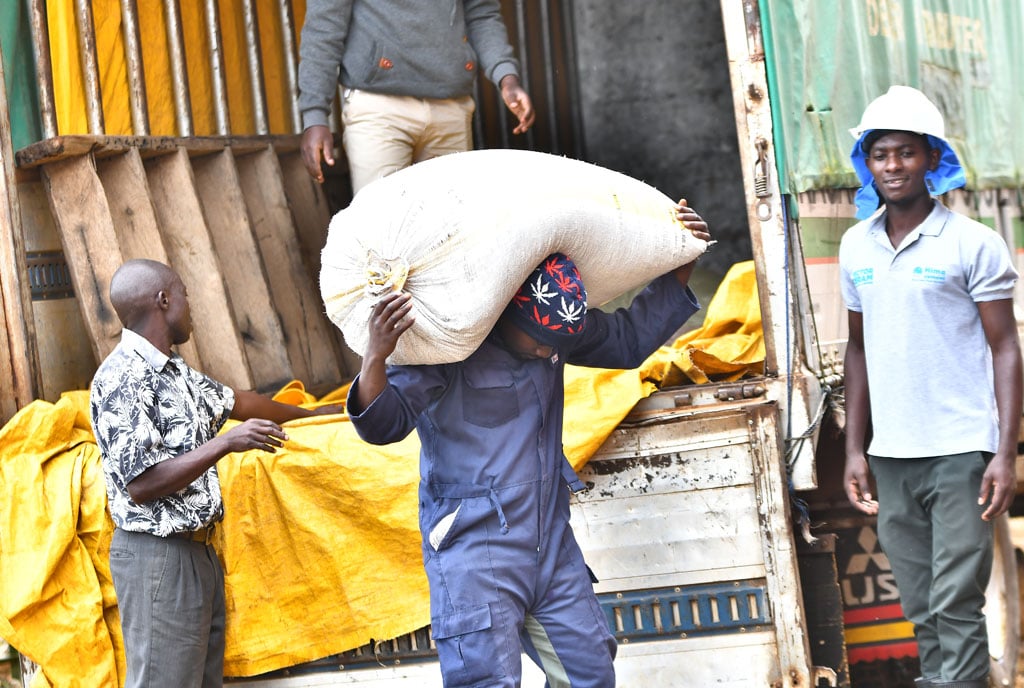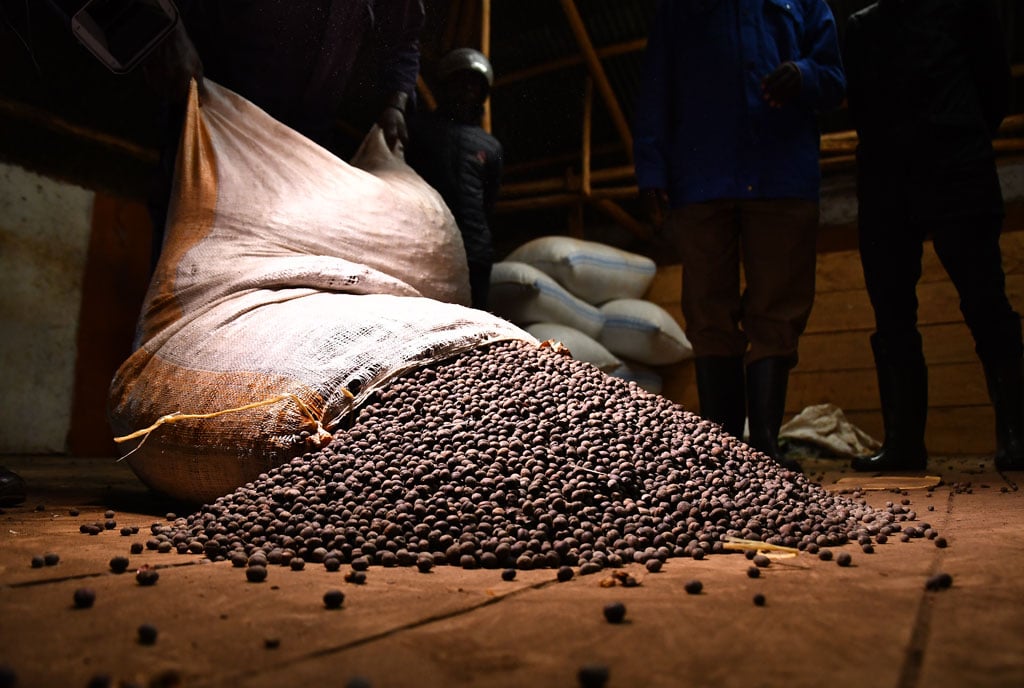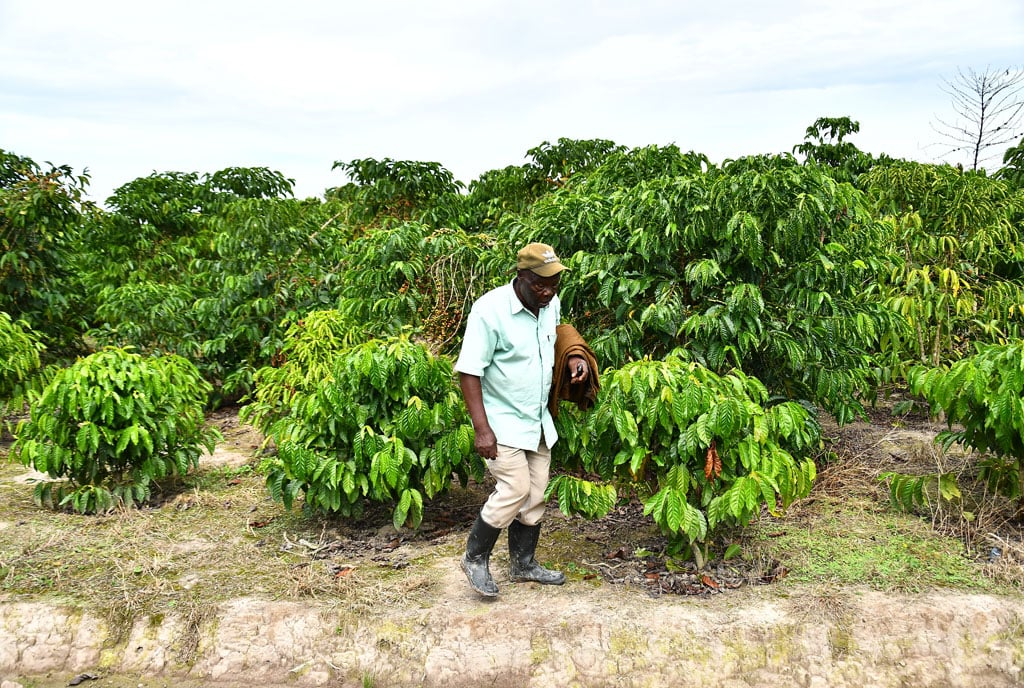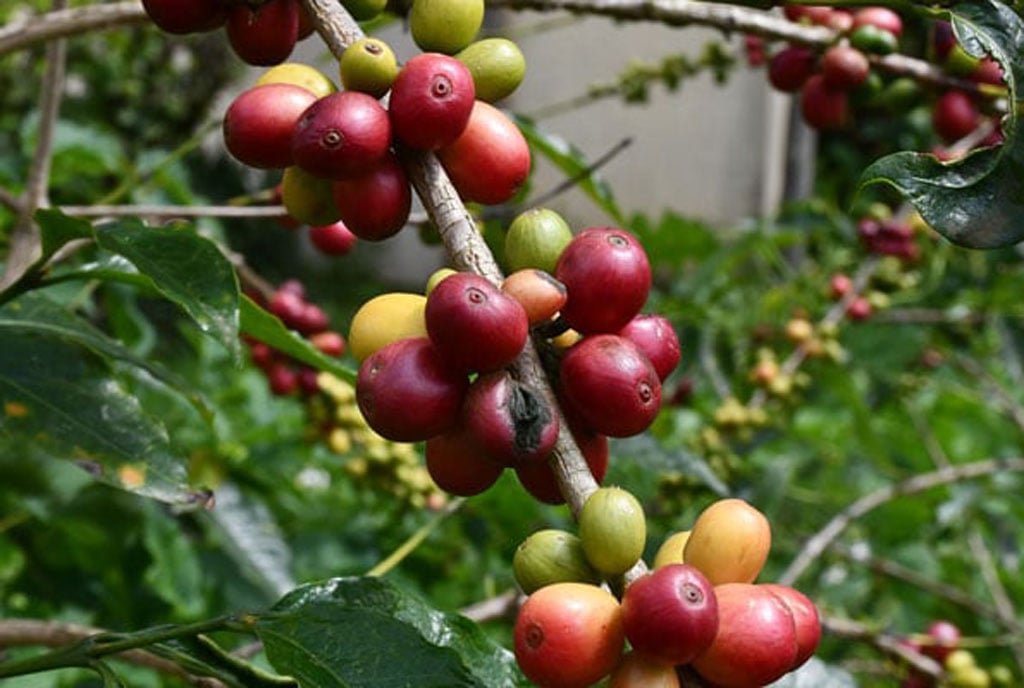
Workers offload robusta coffee to be taken to a processing unit at on May 20, 2024. PHOTO/
A farmers’ group in Kyotera District is working towards a more than fivefold increase in its annual export earnings from the bean by 2029, boosted by a recent Uganda government led Agriculture Cluster Development Project (ACDP), leaders of the coffee exporting cooperative said.
In the district’s Kyakonda Village/Parish, 60-year-old housewife Rovince Kiggundu Ndagire beams with pride as she describes the high-end Ugandan Robusta coffee she produces with agro-inputs sourced exclusively through ACDP.

60-year-old coffee farmer Rovince Kiggundu Ndagire gestures in her garden on May 20, 2024. PHOTO/MICHAEL KAKUMIRIZI
ACDP was a $150 million government initiative supported by the World Bank- and implemented by Uganda’s Ministry of Agriculture, Animal Industry and Fisheries (MAAIF) in 57 districts since 2017.
Through ACDP’s e-voucher component, enthusiastic coffee farmer Ndagire was among 600 female growers of the total 2, 150 Kyotera District farmers who co-funded a cumulative Shs450, 000 in a three phased cycle to get subsidized inputs starting from 2019.
That implies that Ndagire and her counterparts in many profiled farmer groups contributed 33% to get agricultural inputs that included fertilizers, seedlings, pesticides and tarpaulin for improved post-harvest handling.
“The coffee we plant matures in about 3 years unlike the traditional variety that took up to 6 years,” said Ndagire, who is among 1, 078 coffee farmers who subscribe to Kasaali Farmers’ Cooperative Society Limited (KACFA), a coffee exporting group she formally chaired.
“ACDP support to KACFA and individual farmers significantly increased our yield. Previously, I would get only 5 light sacks of traditional coffee harvest, which earned me profits of Shs4-6million from an acre on conventional markets but that has almost doubled now. I can even pay youths to secure my gardens because my coffee is now fair-traded and more profitable. It wasn’t worth it back then,” she added.
‘Make Shs16.5billion annually’
According to KACFA general manager John Wasswa Kajunge, exponential rates in coffee output per unit area –across Kyotera District- have amplified the cooperative’s marketable volumes of the bean, “leading to a giant leap in their export revenue since ACDP attracted many farmers.”
“The inputs which were provided increased farmer numbers, production and output supply,” explained the leader of the cooperative founded in 2013.
Under ACDP’s matching grant component, each of nine beneficiary cooperatives in Kyotera District contributed 33 percent to get huller machines for coffee value addition.

Workers stand next to some of the machines acquired with ACDP funding for a processing unit at Kasaali Farmers’ Cooperative Society Limited (KACFA) in Kyotera District on May 20, 2024. PHOTO/MICHEAL KAKUMIRIZI
However, the Kyotera-based KACFA was the only cooperative that got a Shs299.3million huller shade in addition to a modern huller and grader at a combined Shs450million, following a 33 percent matching grant contribution for the facilities.
“Currently, we are producing more than 48 metric tons of coffee per season and before the project, we were producing 25 metric tons. Therefore, the kilograms have gone up and the sales.

Workers prepare to sort robusta coffee at Kasaali Farmers’ Cooperative Society Limited (KACFA) in Kyotera District on May 20, 2024. PHOTO/MICHEAL KAKUMIRIZI
By May 20, 2024, when Monitor visited KACFA’s premises, leaders of the cooperative reported that they had seen their export coffee earnings rise to Shs3.5 billion, up from Shs1.5billion before the cooperative sought government’s intervention in late December 2018.
“We joined ACDP exporting one coffee container of about 20, 000kgs but last time we managed to export 7 containers to Belgium, Germany and Netherlands,” Wasswa revealed.
With each container estimated over Shs8million, the cooperative also reaps a dollar rate-determined premium averaging Shs30million (per container) in line with the coffee fair trade policy on the international market.
“Many farmers have admired the services leading to the increase of exports. We have already signed a contract to export 10 containers this year and our projections are at 20 containers in the next season,” Wasswa told Monitor.

Kasaali Farmers’ Cooperative Society Limited (KACFA) chairman John Wasswa Kajunge and the group's accountant Justine Najjuko speak during separate interviews with Monitor in Kyotera District on May 20, 2024. PHOTO/MICHEAL KAKUMIRIZI
KACFA accountant Justine Najjuko said: “Due to the increasing export volumes, we think we’re going to make at least Shs16.5billion annually in the next five years.”
Asked how the cooperative will meet its ambitious threshold, Najjuko said: “We are telling most farmers to register to get inputs. Our extension workers go to the field, training farmers on best agronomic practices such that they can be able to produce more volumes of coffee. In addition, when the volumes increase, we shall be able to sustain our cooperative.”
“More farmers are now interested because they liked the grading facilities. They were selling non-graded coffee but now they sell graded coffee, which has big money,” she added.

Graded robusta coffee is seen inside the processing unit of Kasaali Farmers’ Cooperative Society Limited (KACFA) in Kyotera District on May 20, 2024. PHOTO/MICHEAL KAKUMIRIZI

A general view of a coffee processing unit at Kasaali Farmers’ Cooperative Society Limited (KACFA) as seen on May 20, 2024. PHOTO/MICHEAL KAKUMIRIZI

Wasswa said KACFA is offering farmers discounted seedlings of the wilt and red blister disease resistant varieties like Kituza Robusta (KR) 9 to intensify production, and consequently surge export volumes.
“We are selling better quality seedlings to farmers at a discounted Shs1, 500. Last season, we sold 100, 000 seedlings to our farmers,” he disclosed, further noting that the cooperative has since established a coffee nursery and a farm supply shop to offer coffee growers genuine inputs.
‘Still counting losses’
Although respectable annual multibillion profits have boosted confidence in KACFA’s journey towards coffee roasting, sorting and packaging at their premises, the cooperative is still bogged down by limited storage and incomplete machinery.
“The store we have only handles dry coffee cherries (kiboko). For the processed one, we are on a disadvantage because we can’t handle all the coffee. We usually end up losing about 15%,” Wasswa said.
“Currently, we also have to transport our bulked coffee to Kampala for color sorting, which is at Shs200per kg. We do the bagging from Namanve (Wakiso District) but there are many risks involved like the coffee getting lost, storage costs etc,” he added.

A man displays different coffee grades of value added coffe at Kasaali Farmers’ Cooperative Society Limited (KACFA) in Kyotera District on May 20, 2024. PHOTO/MICHEAL KAKUMIRIZI
To reverse the above losses, KACFA leaders viewed that they need a combined Shs650million to purchase a color sorter and a gravity table “in order to complete every stage of coffee packaging from their Kyotera headquarters.”
‘Killer roads fixed’
Kyotera senior agriculture officer Paul Ntambazi, who also doubles as the ACDP focal person, said the demand driven initiative was operational and effective in 14 sub-counties that comprise the district whose authorities aimed to promote maize and coffee.

Kyotera senior agriculture officer Paul Ntambazi speaks during an interview on May 20, 2024. PHOTO/MICHAEL KAKUMIRIZI
According to Ntambanzi, the district received two road chokes on the renovated 10km Kasanvu-Kyakatuma-Mutukula Road which stretches up to Isingiro District, crossing up to Rakai.
“This had become a killer road. Dozens of lives had been lost as motorists failed to navigate the hill. Since this road was developed with a choke, I haven’t seen any accident,” said George William Ssanyu, the Kyasimbi Village chairman in Mutukula Town Council.

Prisoners are transported on a renovated public road in Kyotera District on May 20, 2024. PHOTO/MICHAEL KAKUMIRIZI
Sanyu says: “The road has also provided Mutukulu border region with connectivity to neighbouring Mbarara District and Ntungamo District, through Isingiro District. That has boosted trade by quickening transportation of commodities to market centres in distant areas.”

Road users ride bicycles along a newly refurbished road near the Mutukula Border in Kyotera District on May 20, 2024. PHOTO/MICHAEL KAKUMIRIZI
Ntambazi told Monitor that the other road choke was installed on the newly fixed 25km Katera-Minziro Road.
Why ACDP?
Several farmers who spoke to this publication on May 20, 2024 hailed ACDP for being “an unusually transparent and effective government led initiative.”
“Unlike relief projects, cofunding implied farmers would own up the project. It greatly increased household income and welfare. We have more than 150 pending applicants,” Ntambazi said as he appealed for another phase of the project.
“We had 40 farm supply outlets but now we have over 67 shops. Farmers could buy around 5,000 bags of NPK fertilizers but now farm supplies sale over 25, 000 bags in a season, meaning there’s an increased demand due to awareness by ACDP.”

A coffee farmer is seen in his garden in Kyotera District on May 20, 2024. PHOTO/MICHEAL KAKUMIRIZI
During implementation of ACDP, project funds were not directly given to district officials but rather, directly credited to beneficiary cooperatives or e-vouchered farmers.
ACDP phase one concluded in Uganda on May 31, 2024.
Tip
Agricultural officers advise farmers to opt for old clone D and KR8, 9 or 10 coffee varieties which they say have been improved to address challenges of the old clones.

Robusta coffee in the Buganda sub-region, central Uganda on May 20, 2024. PHOTO/MICHEAL KAKUMIRIZI
RELATED STORIES ABOUT ACDP








